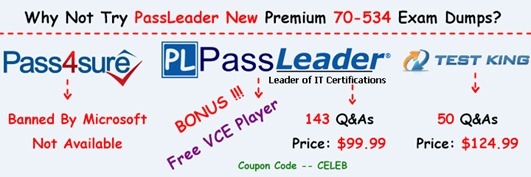100% Pass Ensure 70-534 Exam Dumps: PassLeader provides the newest 70-534 dumps updated in recent days with total 143q exam questions, it is the best study materials for preparing 70-534 certification exams. PassLeader’s 70-534 exam questions will offer you the latest questions and answers with free VCE and PDF file to download, which will help you 100% passing 70-534 exam. And PassLeader also supply the newest free version VCE Player now!
keywords: 70-534 exam,143q 70-534 exam dumps,143q 70-534 exam questions,70-534 pdf dumps,70-534 vce dumps,70-534 practice test,70-534 study guide,Architecting Microsoft Azure Solutions Exam
QUESTION 21
You have business services that run on an on-premises mainframe server. You must provide an intermediary configuration to support existing business services and Azure. The business services cannot be rewritten. The business services are not exposed externally. You need to recommend an approach for accessing the business services. What should you recommend?
A. Connect to the on-premises server by using a custom service in Azure.
B. Expose the business services to the Azure Service Bus by using a custom service that uses relay binding.
C. Expose the business services externally.
D. Move all business service functionality to Azure.
Explanation:
http://azure.microsoft.com/en-gb/documentation/articles/service-bus-dotnet-how-to-use-relay/
QUESTION 22
You design an Azure web application. The web application is accessible by default as a standard cloudapp.net URL. You need to recommend a DNS resource record type that will allow you to configure access to the web application by using a custom domain name. Which DNS record type should you recommend?
A. SRV
B. MX
C. CNAME
D. A
Answer: C
Explanation:
http://azure.microsoft.com/en-gb/documentation/articles/cloud-services-custom-domain-name/
QUESTION 23
A company hosts a website and exposes web services on the company intranet. The intranet is secured by using a firewall. Company policies prohibit changes to firewall rules. Devices outside the firewall must be able to access the web services. You need to recommend an approach to enable inbound communication. What should you recommend?
A. The Azure Access Control Service
B. Windows Azure Pack
C. The Azure Service Bus
D. A web service in an Azure role that relays data to the internal web services
Answer: C
Explanation:
http://azure.microsoft.com/en-gb/documentation/articles/cloud-services-dotnet-hybrid-app-using-service-bus-relay/
https://brosteins.com/2015/02/13/accessing-internal-data-from-mobile-apps/
QUESTION 24
You are designing an Azure application. The application includes services hosted in different geographic locations. The service locations may change. You must minimize the cost of communication between services. You need to recommend an approach for data transmission between your application and Azure services. The solution must minimize administrative effort. What should you recommend?
A. Azure Table storage
B. Service Bus
C. Service Management API
D. Azure Queue storage
Answer: B
Explanation:
https://msdn.microsoft.com/library/azure/hh767287.aspx
QUESTION 25
You are designing a distributed application for Azure. The application must securely integrate with on-premises servers. You need to recommend a method of enabling Internet Protocol security (IPsec)-protected connections between on-premises servers and the distributed application. What should you recommend?
A. Azure Access Control
B. Azure Content Delivery Network (CDN)
C. Azure Service Bus
D. Azure Site-to-Site VPN
Answer: D
Explanation:
https://msdn.microsoft.com/en-us/library/azure/dn133798.aspx
http://azure.microsoft.com/en-gb/documentation/articles/virtual-networks-create-site-to-site-cross-premises-connectivity/
QUESTION 26
A company has 10 on-premises SQL databases. The company plans to move the databases to SQL Server 2012 that runs in Azure Infrastructure-as-a-Service (IaaS). After migration, the databases will support a limited number of Azure websites in the same Azure Virtual Network. You have the following requirements:
– You must restore copies of existing on-premises SQL databases to the SQL servers that run in Azure IaaS.
– You must be able to manage the SQL databases remotely.
– You must not open a direct connection from all of the machines on the on-premises network to Azure.
– Connections to the databases must originate from only five Windows computers.
– You need to configure remote connectivity to the databases.
Which technology solution should you implement?
A. Azure Virtual Network site-to-site VPN
B. Azure Virtual Network multi-point VPN
C. Azure Virtual Network point-to-site VPN
D. Azure ExpressRoute
Answer: C
Explanation:
https://msdn.microsoft.com/library/azure/dn133792.aspx
QUESTION 27
You have several virtual machines (VMs) that run in Azure. You also have a single System Center 2012 R2 Configuration Manager (SCCM) primary site on-premises. You have the following requirements:
– All VMs must run on the same virtual network.
– Network traffic must be minimized between the on-premises datacenter and Azure.
– The solution minimize complexity.
You need to use SCCM to collect inventory and deploy software to Azure VMs. What should you do first?
A. Configure client push for the Azure virtual network.
B. Enable and configure Operations Insights in Azure.
C. Install a cloud distribution point on an Azure VM.
D. Install a secondary site underneath the primary site onto an Azure VM.
Answer: C
Explanation:
http://www.aidanfinn.com/?p=16047
QUESTION 28
You are running a Linux guest in Azure Infrastructure-as-a-Service (IaaS). You must run a daily maintenance task. The maintenance task requires native BASH commands. You need to configure Azure Automation to perform this task. Which three actions should you perform? Each correct answer presents part of the solution.
A. Create an automation account.
B. Create an Orchestrator runbook.
C. Create an asset credential.
D. Run the Invoke-Workflow Azure PowerShell cmdlet.
E. Import the SSH PowerShell Module.
Answer: ACE
Explanation:
http://azure.microsoft.com/en-gb/documentation/articles/automation-create-runbook-from-samples/
http://channel9.msdn.com/Shows/Azure-Friday/Azure-Automation-104-managing-Linux-and-creating-Modules-with-Joe-Levy
http://azure.microsoft.com/blog/2014/07/29/getting-started-with-azure-automation-automation-assets-2/
QUESTION 29
A company has multiple Azure subscriptions. It plans to deploy a large number of virtual machines (VMs) into Azure. You install the Azure PowerShell module, but you are unable connect to all of the company’s Azure subscriptions. You need to automate the management of the Azure subscriptions. Which two Azure PowerShell cmdlets should you run?
A. Get-AzurePublishSettingsFile
B. Import-AzurePublishSettingsFile
C. Add-AzureSubscription
D. Import-AzureCertificate
E. Get-AzureCertificate
Answer: AB
Explanation:
https://msdn.microsoft.com/en-us/library/dn385850%28v=nav.70%29.aspx
QUESTION 30
Contoso, Ltd., uses Azure websites for public-facing customer websites. The company has a mobile app that requires customers sign in by using a Contoso customer account. Customers must be able to sign on to the websites and mobile app by using a Microsoft, Facebook, or Google account. All transactions must be secured in-transit regardless of device. You need to configure the websites and mobile app to work with external identity providers. Which three actions should you perform? Each correct answer presents part of the solution.
A. Request a certificate from a domain registrar for the website URL, and enable TLS/SSL.
B. Configure IPsec for the websites and the mobile app.
C. Configure the KerberosTokenProfile 1.1 protocol.
D. Configure OAuth2 to connect to an external authentication provider.
E. Build an app by using MVC 5 that is hosted in Azure to provide a framework for the underlying authentication.
Answer: ADE
Explanation:
http://www.asp.net/mvc/overview/security/create-an-aspnet-mvc-5-app-with-facebook-and-google-oauth2-and-openid-sign-on
http://www.passleader.com/70-534.html
QUESTION 31
You are designing a solution that will interact with non-Windows applications over unreliable network connections. You have a security token for each non-Windows application. You need to ensure that non-Windows applications retrieve messages from the solution. Where should you retrieve messages?
A. An Azure Queue
B. The Azure Service Bus Queue
C. An Azure blob storage container that has a private access policy
D. Azure Table storage
Answer: B
Explanation:
http://azure.microsoft.com/en-gb/documentation/articles/fundamentals-service-bus-hybrid-solutions/
QUESTION 32
You are the administrator for a company named Contoso, Ltd. Contoso also has an Azure subscription and uses many on-premises Active Directory products as roles in Windows Server including the following:
– Active Directory Domain Services (AD DS)
– Active Directory Certificate Services (AD CS)
– Active Directory Rights Management Services (AD RMS) Active Directory Lightweight Directory Services (AD LDS) Active Directory Federation Services (AD FS).
Contoso must use the directory management services available in Azure Active Directory. You need to provide information to Contoso on the similarities and differences between Azure Active Directory and the Windows Server Active Directory family of services. Which feature does Azure Active Directory and on-premises Active Directory both support?
A. Using the GraphAPI to query the directory
B. Issuing user certificates
C. Supporting single sign-on (SSO)
D. Querying the directory with LDAP
Answer: C
Explanation:
http://justazure.com/azure-active-directory-part-5-graph-api/
http://windowsitpro.com/azure/azure-active-directory-vs-premises-active-directory
https://technet.microsoft.com/en-gb/windowsserver/dd448613.aspx?f=255&MSPPError=-2147217396
QUESTION 33
A company has a very large dataset that includes sensitive information. The dataset is over 30 TB in size. You have a standard business-class ISP internet connection that is rated at 100 megabits/second. You have 10 4-TB hard drives that are approved to work with the Azure Import/Export Service. You need to migrate the dataset to Azure. The solution must meet the following requirements:
– The dataset must be transmitted securely to Azure.
– Network bandwidth must not increase.
– Hardware costs must be minimized.
What should you do?
A. Prepare the drives with the Azure Import/Export tool and then create the import job.
Ship the drives to Microsoft via a supported carrier service.
B. Create an export job and then encrypt the data on the drives by using the Advanced
Encryption Standard (AES). Create a destination Blob to store the export data.
C. Create an import job and then encrypt the data on the drives by using the Advanced
Encryption Standard (AES). Create a destination Blob to store the import data.
D. Prepare the drives by using Sysprep.exe and then create the import job.
Ship the drives to Microsoft via a supported carrier service.
Answer: A
Explanation:
http://azure.microsoft.com/en-gb/documentation/articles/storage-import-export-service/
QUESTION 34
Hotspot Question
You have an Azure website that runs on several instances. You have a WebJob that provides additional functionality to the website. The WebJob must run on all instances of the website. You need to ensure that the WebJob runs even when the website is idle for long periods of time. How should you create and configure the WebJob object? To answer, select the appropriate options in the answer area.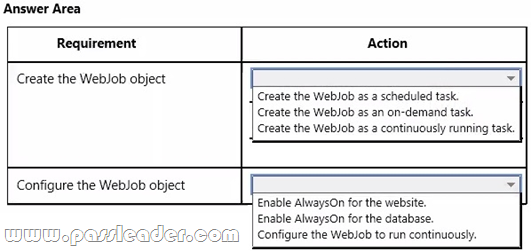
Answer: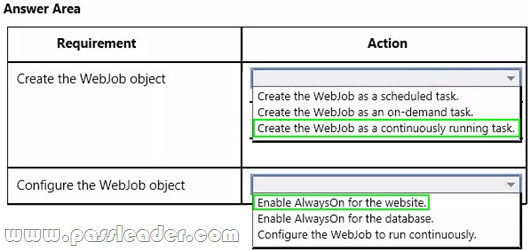
Explanation:
http://azure.microsoft.com/en-us/documentation/articles/web-sites-create-web-jobs/
QUESTION 35
Drag and Drop Question
You have a website that displays text, pictures, video files, and audio files. The website processes requests from countries and regions all over the world. You plan to migrate the website to the Azure platform. The website has the following requirements:
– Encode, store, and stream audio and video at scale.
– Load-balance communications with the website instance that is closest to the user’s location.
– Deliver content with high-bandwidth and low latency.
You need to recommend the technologies to implement the solution. Which technologies should you recommend? To answer, drag the appropriate technology to the correct requirement. Each technology may be used once, more than once, or not at all. You may need to drag the split bar between panes or scroll to view content.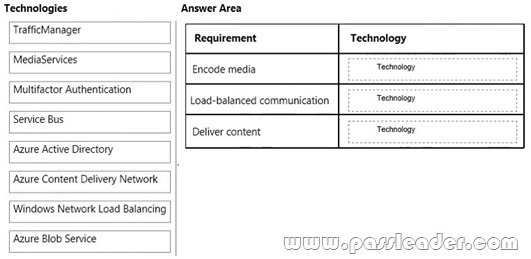
Answer: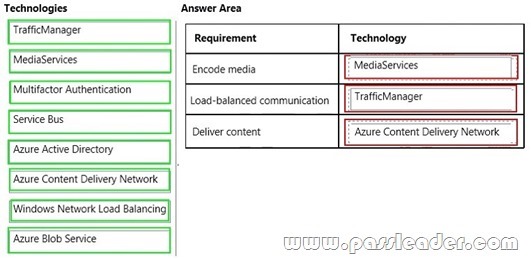
Explanation:
http://azure.microsoft.com/en-gb/services/media-services/
http://azure.microsoft.com/en-gb/services/
QUESTION 36
You are designing a Windows Azure application that will use Windows Azure Table storage. The application will allow teams of users to collaborate on projects. Each user is a member of only one team. You have the following requirements:
– Ensure that each user can efficiently query records related to his or her team’s projects.
– Minimize data access latency.
You need to recommend an approach for partitioning table storage entities. What should you recommend?
A. Partition by user.
B. Partition by team.
C. Partition by project.
D. Partition by the current date.
Answer: B
QUESTION 37
You are designing a Windows Azure application that will store data in two SQL Azure databases. The application will insert data in both databases as part of a single logical operation. You need to recommend an approach for maintaining data consistency across the databases. What should you recommend?
A. Execute database calls on parallel threads.
B. Wrap the database calls in a single transaction scope.
C. Use Microsoft Distributed Transaction Coordinator (MSDTC).
D. Handle errors resulting from the database calls by using compensatory logic.
Answer: D
QUESTION 38
You are designing a Windows Azure application. The application includes two web roles and three instances of a worker role. The web roles will send requests to the worker role through one or more Windows Azure Queues. You have the following requirements:
– Ensure that each request is processed exactly one time.
– Minimize the idle time of each worker role instance.
– Maximize the reliability of request processing.
You need to recommend a queue design for sending requests to the worker role. What should you recommend?
A. Create a single queue.
Send requests on the single queue.
B. Create a queue for each web role.
Send requests on all queues at the same time.
C. Create a queue for each worker role instance.
Send requests on each worker queue in a round robin.
D. Create a queue for each combination of web roles and worker role instances.
Send requests to all worker role instances based on the sending web role.
Answer: A
QUESTION 39
Drag and Drop Question
You need to automate tasks with Azure by using Azure PowerShell workflows. How should you complete the Azure PowerShell script? To answer, drag the appropriate cmdlet to the correct location. Each cmdlet may be used once, more than once, or not at all. You may need to drag the split bar between panes or scroll to view content.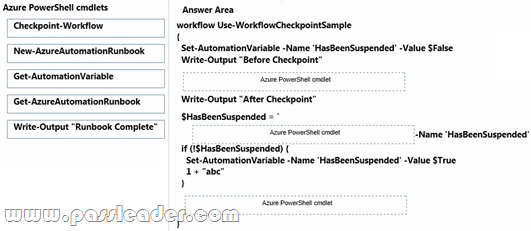
Answer: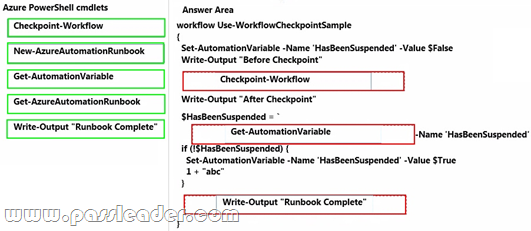
Explanation:
https://gallery.technet.microsoft.com/scriptcenter/How-to-use-workflow-cd57324f
QUESTION 40
Hotspot Question
A company uses Azure for several virtual machine (VM) and website workloads. The company plans to assign administrative roles to a specific group of users. You have a resource group named GROUP1 and a virtual machine named VM2. The users have the following responsibilities:
You need to assign the appropriate level of privileges to each of the administrators by using the principle of least privilege. What should you do? To answer, select the appropriate target objects and permission levels in the answer area.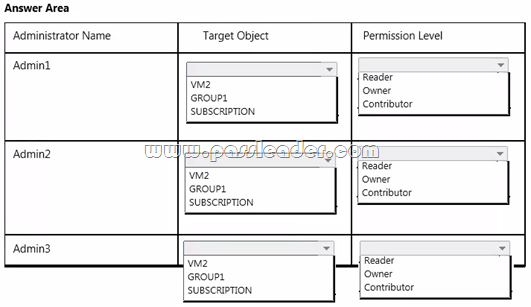
Answer: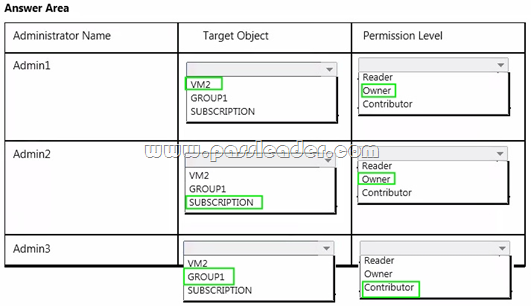
Explanation:
http://azure.microsoft.com/en-us/documentation/articles/role-based-access-controlconfigure/
